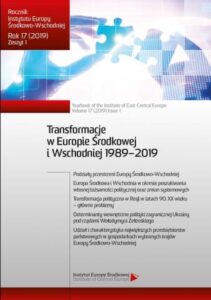Podziały przestrzeni Europy Środkowo-Wschodniej
Berglund S., Ekman J., Deegan-Kraus K. (eds), The Handbook of Political Change in Eastern Europe, Cheltenham 2014.
Bernhagen P., Marsh M., Voting and Protesting: Explaining Citizen Partici- pation in Old and New European Democracies, „Democratization” 2007, vol. 14, no. 1.
Bliss P., Central European Regimes: Putting Contemporary Trends in Contex, „Harvard International Review” 2018, Spring.
Bninska M., Poland is the leader in the FDI inflow in Central and Southeast Europe, https://financialobserver.eu /poland/ poland-is-the-leader-in- the-fdi-inflow-in-central-and-southeast-europe/.
Börzel T., Lebani B., „The transformative power of Europe” beyond enlarge- ment: the EU’s performance in promoting democracy in its neighbourhood, „East European Politics” 2017, vol. 33, no. 1.
Bruszt L., Regional Normalization and National Deviations: EU Integra- tion and Transformations in Europe’s Eastern Periphery, „Global Policy” 2015, vol. 6, June.
Burlyuk O., Sapovalova N., Veni, Vidi… Vici? EU performance and two faces of conditionality towards Ukraine, „East European Politics” 2017, vol. 33, no. 1. Cianetti L., Dawson J., Hanley S., Rethinking „democratic backsliding” in Cen- tral and Eastern Europe – looking beyond Hungary and Poland, „East European Politics” 2018, vol. 34, no. 3.
Corruption Perception Index 2004, http://www.offnews.inf.
Corruption Perception Index 2010, https://www. transparency.org/cpi2010/results.
Corruption Perception Index 2017: Short Methodology Note, https://www.transparency.org/news/feature/corruption_perceptions_index_2017#research. Democracy in Crisis. Freedom in the World 2018, Washington D.C. 2018.Democracy Index 2012. Democracy at a standstill. A Report from The Economists Intelligence Unit, London 2013.
Democracy Index 2017. Free speech under attack. A Report by The Economist Intelligence Unit, London 2018.
Democracy Index 2018. Me too? Political participation, protest and democracy. A Report by The Economist Intelligence Unit, London 2019.
Ekiert G., Kubik J., Contentious Politics in New Democracies: East Germa- ny, Hungary, Poland, and Slovakia, 1989–1993, „World Politics” 1998, vol. 50, no. 4.
Ekman J., Gerghina S., Podolian O., Challenges and realities of political par- ticipation and civic engagement in Central and Eastern Europe, „East Eu- ropean Politics” 2016, vol. 32, no. 1.
Epstein R., Jacoby W., Eastern Enlargement Ten Years ON: Transcending the East-West Divide?, „JCMS: Journal of Common Market Studies” 2014, vol. 52, no. 1.
Fagan A. et al., Unintended consequences of EU Conditionality on (Potential) Candidates, MAXCAP Working Paper Series, no. 14, Berlin 2015.
Gulczyński M., Nauka o polityce, Warszawa 2007.
Gygli S., Haelg F., Sturm J.-E., The KOF Globalisation Index – Revisited, The KOF Working Paper 439, Zurich 2018.
Halecki O., Borderlands of Western Civilization. A History of East Central Europe, New York 1952.
Holmes K., Two Decades of Measuring Economic Freedom: A Look Back on the Index, [w:] T. Miller, A. B. Kim, K. R. Holmes (eds), 2014 Index of Economic Freedom, Washington D.C. 2014.
Human Development Indices and Indicators 2018. Statistical Update, New York 2018.
Human Development Report 2013. The Rise of the South: Human Progress in a Diverse World, New York 2013.
Index of economic freedom 2018, https://www.heritage.org/index/ranking. Jacobsson K. (ed.), Urban Grassroots Movements in Central and Eastern Europe, Farnham 2015.
Klingemann H. D., Fuchs D., Zielonka J., Dissatisfied Democrats. Democratic Maturation in Old and New Democracies, [w:] R. Dalton, Ch. Weizel (eds), Civic Culture Transformed: From Allegiant to Assertive Citizens, Cambridge 2014.
Kłoczowski J., Europa Środkowo-Wschodnia w przestrzeni europejskiej, http:// jazon.hist.uj.edu.pl/zjazd/materialy/kloczowski.pdf.
KOF Globalization Index 2012, https://www.kof.ethz.ch/en/forecasts-and- indicators/indicators/kof-globalisation-index.html.
Marchenko A., Civic activities in Eastern Europe. Links with democratic po- litical culture, „East European Politics” 2016, vol. 32, no. 1.
Miller T., Holmes K., 2010 Index of Economic Freedom. The Link Between Economic Opportunity and Prosperity, https://www.heritage.org/index/ pdf/2010/index2010_highlights.pdf.
Miller T., Kim A., Roberts J. (eds), 2018 Index of Economic Freedom, Wash- ington D.C. 2018.
Nations in Transit 2013. Authoritarian Aggression and the Pressures of Aus- terity. Selected Data from Freedom House’s Annual Analysis of Democratic Development from Central Europe and Eurasia, Washington D.C. 2013.
Nations in Transit 2018. Confronting Illiberalism, Washington D.C. 2018. Norris P., Democratic Phoenix: Reinventing Political Activism, Cambridge 2002.
O’Driscoll G. P., Fuelner E. J., O’Grady M. A., 2003 Index of Economic Freedom, Washington 2003.
Pietraś M., Europa Środkowo-Wschodnia w strukturze ładu międzynarodowego, [w:] H. Chałupczak, M. Pietraś P. Tosiek (red.), Europa Środkowo- -Wschodnia w procesie transformacji i integracji. Wymiar polityczny, Zamość 2010.
Pietraś M., Globalizacja jako proces zmiany społeczności międzynarodowej, [w:] M. Pietraś (red.), Oblicza procesów globalizacji, Lublin 2002.
Pietraś M., Istota i zakres procesów globalizacji, „Sprawy Międzynarodowe” 2002, nr 2.
Pietraś M., „Pęknięta” przestrzeń gospodarcza w Europie Środkowo-Wschod- niej, [w:] H. Chałupczak, M. Pietraś, Ł. Potocki (red.), Europa Środkowo- -Wschodnia w procesie transformacji i integracji. Wymiar gospodarczy, Zamość 2018.
Pietraś M., Procesy globalizacji, [w:] M. Pietraś (red.), Międzynarodowe sto- sunki polityczne, Lublin 2007.
Pietraś M., Specyfika Europy Środkowo-Wschodniej jako przestrzeni społecz- nej, [w:] H. Chałupczak, M. Pietraś, E. Pogorzała (red.), Europa Środko- wo-Wschodnia w procesie transformacji i integracji. Wymiar społeczny, Zamość 2013.
Piskorska B., Soft power w polityce UE wobec państw Partnerstwa Wschod- niego, Lublin 2017.
Reporters Without Borders, Press Freedom Index 2013, http://en.rsf.org/press- freedom-index-2013,1054.html.
Reporters Without Borders, 2018 World Press Freedom Index, https://rsf.org/ en/ranking_table?sort=asc&order=Ranking.
Schwab K. (ed.), The Global Competitiveness Report 2017–2018, Geneva 2017. Schwab K., Porter M. (eds), The Global Competitiveness Report 2006–2007, Basingstoke 2006.


